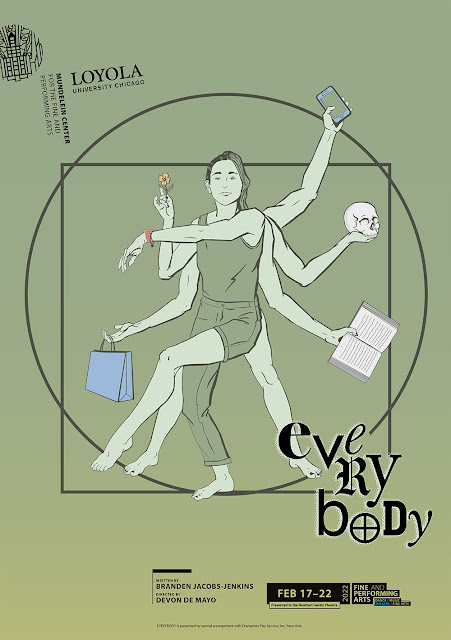Loyola Chicago Theatre Explores Death in "Everybody"
In his play "Everybody,” based on the15th century Catholic morality play “Everyman,”
Branden Jacobs-Jenkins depicts death as God’s slick, clever and suited-up assistant.
 |
Promotional poster from Loyola's Fine and Performing Arts Department. |
"Everyman" reinforced ideas about Catholic life and death.
The author of the play is only known to contemporary scholars by the name Peter.
“Everyman” emphasized the importance of doing good deeds as the primary means of accessing heaven as a Catholic.
“Everybody” seems like the perfect play for a Jesuit Catholic university to produce, except that
Jacobs-Jenkins’ version is adapted for a secular audience. That didn’t stop Loyola University Chicago
from making “Everybody” part of their 2021-2022 theater season.
Levi Welch, a senior theatre major and one of two assistant directors for Loyola’s production of
“Everybody” said that Jacobs-Jenkins invites the audience in, blurring the line between performance
and the performing. Most of the actors start the show sitting in the audience.
“It makes you think about the randomness of death and how it can happen to anybody at any time,” Welch said.
According to Welch, the play seamlessly blends the lines of theatricality and reality.
Each night, the show began with a lottery to choose the cast for the evening. Actors would spin a wheel
to determine what part they would play for the night.
Jacobs-Jenkins brings the concepts presented in “Everyman” to a secular, 21stcentury audience by removing the references to Catholicism and instead focusing on the importance
of life and love.
“The show presents love as something internal, that comes from within. That to me is the lynch pin
of the piece. What makes it so successful and satisfying and beautiful is that it’s about love,” Welch said.
“For me, that is the core of what makes this piece work today and I think he’s a genius for that.”
Jacobs-Jenkins makes the show about the love that you carry. The character Love is in the audience
the entire show until their first scene.
“There is a kind of Love present in all the scenes,” Welch said.
Ema Kester, a senior theatre major, played Love in the show. Kester said her characterization of
Love developed throughout the rehearsal process.
“At the beginning I kind of took a tough love kind of route…but then I realized it’s more self-love
that is trying to happen there, Kester said.
Loyola’s production of “Everybody” presents the idea that self-love will be all a person has when they
face death. In the final scene of the play, Everybody realizes that only Love can accompany them in death.
They will not have their mind, their strength, their relationships, or their beauty, only Love.
Kester views the support that Love has for Everybody as, “A lot of self-love and a lot of helping
Everybody kind of feel their emotions as they’re happening and process them rather than
letting them be influenced by the previous actions that have happened in the play.”
Even though “Everybody” deviates from its source material, the cast and dramaturg of Loyola’s
production worked closely with Loyola Professor Edward Wheatley, a medieval scholar and author.
Wheatley spoke with the cast early in the rehearsal process to give them some background on the 15th century play.
In his early talks with the cast, Wheatley discussed that in “Everyman,” a character named Good Deeds
accompanies Everyman to his death. Wheatley told the cast this was a deliberate choice,
serving the play’s Catholic messaging by showing audiences that doing good deeds would
give them access to heaven.
In a post-show talkback with the audience, Wheatley said the adaptation revives important aspects of the play while also
making the show accessible to a 21st century audience, particularly in its use of comedy.
However, for the actors, it was difficult to find the balance between the show’s comedy and heavy subject
matter.
“It was a little intimidating to be like, ‘How do we make this work without taking death too lightly?’
Cause it’s a heavy subject no matter how funny a play is. It’s a difficult thing to talk about,” Kester said.
Although, humor was not present in the original “Everyman.”
“Death isn’t a barrel of laughs in ‘Everyman,’” Wheatley said.
Although “Everyman” wasn’t as comedic as it’s contemporary brother, the play still served as a means of
processing death for 15th century Catholics.
Death was rampant and touched countless people during the Black Death epidemic, which had several
waves from 1331-1770. Wheatley suggested that their proximity to death in the epidemic likely
influenced Catholics of the time to seek reassurance that they would see heaven.
“Everyman” was written and performed around the time that the global epidemic of the Black Death
was spreading. According to History.com, the Black Death was airborne and spread rapidly.
The virus worked so fast that it could sometimes kill a person within hours, even if they appeared perfectly
fine.
For a 21st century audience living through a global pandemic that has taken around 1 million lives, laughter makes it
easier to digest. The experiences with death and disease of those living in the 15th century are painfully similar to the COVID-19 pandemic, making the play’s title of “Everybody” even more relevant.
For the cast of Loyola’s “Everybody,” it seems working on the show helped them face their own fears about death.
“I’m not afraid of death anymore,” said Maggie Smith, who played the character of God.
For some, it felt like the show connected them to others.
“Everybody else is in the same boat of misunderstanding as us,” said senior Duncan Corbin.
Death is a complicated part of the life cycle that humans have been trying to make sense of for as
long as they have existed. But if everybody is trying to figure it out together, it feels a little easier
to do so.


Comments
Post a Comment